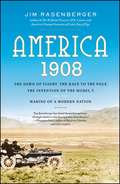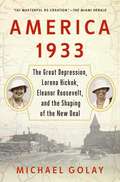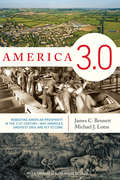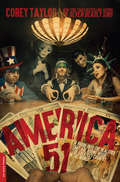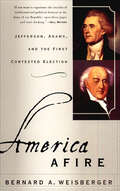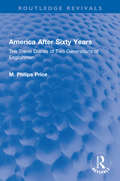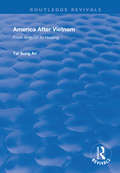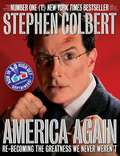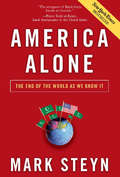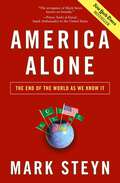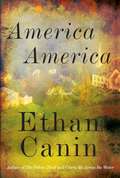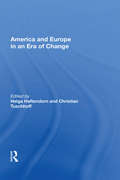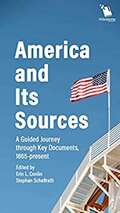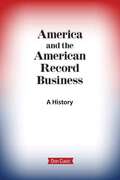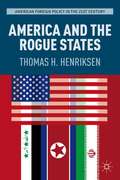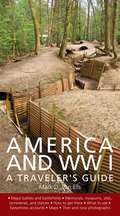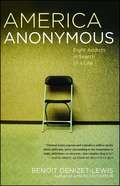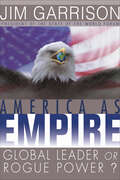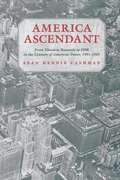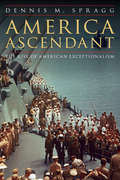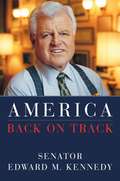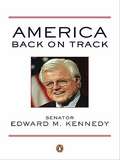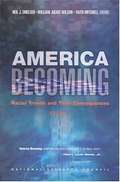- Table View
- List View
America 1908: The Dawn of Flight, the Race to the Pole, the Invention of the Model T, and the Making of a Modern Nation
by Jim RasenbergerA breathtaking ride through the highs and lows of one spectacular, pivotal year in American history. As the earth turned toward the sun on the first morning of 1908, human flight remained, for most Americans, in the realm of myth and dream. But before the darkness fell on New Year's Eve at the end of the year, the Wright brothers would be worldwide celebrities, heralded as the first people in all of human history to conquer the sky. It was the year Teddy Roosevelt sent the Great White Fleet on a voyage around the globe, Robert Peary began his courageous dash to the North Pole, six automobiles left Times Square on an epic twenty-thousand-mile race to Paris, and Henry Ford introduced an oddly shaped new automobile called the Model T. It was a time of seemingly boundless innovation - everything was bigger, better, fast, and greater than ever before. In New York and Chicago, banks of high-speed elevators zipped through vertical shafts in the tallest buildings on earth. Pneumatic tubes whisked mail between far-flung post offices in minutes. Women cleaned their homes with amazing new devices called vacuums. And as American engineers cut a fifty-mile canal through the Isthmus of Panama, the very air buzzed with the imagined potential of new technology, including a "portable wireless telephone" that would someday allow people to talk while they walked. Meanwhile, the New York Giants battled the Chicago Cubs in one of the most thrilling seasons in baseball history, and a reluctant William Howard Taft was elected twenty-seventh president of the United States. By turns gripping and humorous, shocking and delightful, Jim Rasenberger's America, 1908 brings to life our nation as it was one hundred years ago, at a moment of delirious optimism and pride, a time when Americans believed that even the most intractable problems would soon be solved and that the future was bound to be better than the past. "What will the year 2008 bring us?" pondered the New York World on New Year's Day of 1908. "What marvels of development await the youth of tomorrow?" As Thomas Edison said later that year, "Anything, everything, is possible." Shedding new light on stories we thought we knew and telling fresh stories we can't believe we've never heard, American, 1908 is a rousing chronicle of a country on the brink of greatness - and a timely, thought-provoking glimpse at a younger America, even as we wonder what awaits us in the century ahead.
America 1933
by Michael GolayThe first account of the remarkable eighteen-month journey of Lorena Hickok, intimate friend of Eleanor Roosevelt, throughout the country during the worst of the Great Depression, bearing witness to the unprecedented ravages; an indelible portrait of an unprecedented crisis."All I can say is that these people have GOT to have clothing--RIGHT AWAY," Lorena Hickok wrote from drought-ravaged North Dakota in 1933. The cigar-smoking, poker-playing Hickok was the top woman news reporter of the day, and the intimate friend of Eleanor Roosevelt. Forced to abandon her thriving journalism career due to her closeness to the First Lady, Hickok was hired by FDR's right hand man Harry Hopkins to embark upon a grueling journey to the hardest hit areas across the country, during the harshest year of the Great Depression, to report back about the degree of devastation. Acclaimed historian Michael Golay draws on a trove of previously untapped original sources--including the moving and remarkably intimate almost daily letters between Hickok and Eleanor--to re-create that extraordinary journey, never before profiled. Hickok traveled almost nonstop for eighteen months, from January 1933 to August 1934--moving into the White House, to a room adjoining Eleanor's for her stays in between--driving through hellish dust storms, armed rebellion by coal workers in West Virginia, and a near revolution by Midwest farmers, writing a series of deeply empathetic and searing reports to Hopkins and letters to Eleanor that constitute an unparalleled record of the worst economic crisis ever to afflict the country, and which profoundly influenced the nature of the FDR's unprecedented relief efforts. This beautifully written account brings reveals at last Hickok's pivotal contribution, as well as shedding important new light on her intense but ill-fated relationship with Eleanor and the forces that inevitably came between them.
America 1933: The Great Depression, Lorena Hickok, Eleanor Roosevelt, and the Shaping of the New Deal
by Michael GolayThe first account of the remarkable eighteen-month journey of Lorena Hickok, intimate friend of Eleanor Roosevelt, throughout the country during the worst of the Great Depression, bearing witness to the unprecedented ravaged.During the harshest year of the Great Depression, Lorena Hickok, a top woman news reporter of the day and intimate friend of Eleanor Roosevelt, was hired by FDR's right hand man Harry Hopkins to embark upon a grueling journey to the hardest hit areas across the country to report back about the degree of devastation. Distinguished historian Michael Golay draws on a trove of original sources--including moving and remarkably intimate almost daily letters between Hickok and Eleanor Roosevelt--as he re-creates that extraordinary journey. Hickok traveled almost nonstop for eighteen months, from January 1933 to August 1934, driving through hellish dust storms, rebellion by coal workers in Pennsylvania and West Virginia, and a near revolution by Midwest farmers. A brilliant observer, Hickok's searing and deeply empathetic reports to Hopkins and her letters to Mrs. Roosevelt are an unparalleled record of the worst economic disaster in the history of the country. Historically important, they crucially influenced the scope and strategy of the Roosevelt Administration's unprecedented relief efforts. America 1933 reveals Hickok's pivotal contribution to the policies of the New Deal, and sheds light on her intense but ill-fated relationship with Eleanor Roosevelt and the forces that inevitably came between them.
America 2040
by Evan InnesIt stretches out beyond the planets to the vastness of infinite space. The time has come for America's best and brightest men and women to again become pioneers, to carry freedom's precious message to a new wilderness more dangerous, more lawless, and more exciting than any traveled before. It will determine America's destiny. Locked in a final deadly struggle with the Soviets, the free world trembles on the brink of nuclear holocaust. But whatever the Earth's fate, the spirit Of America must not be allowed to die. The dauntless courage of those who first challenged the uncharted regions of the Old West now returns to blaze a new trail into the unknown. Led by Captain Duncan Rodrick, a man of strength and daring, the most advanced spaceship ever designed prepares for an incredible journey across the universe. But on board the ship itself is an enemy willing to die to destroy them all, a woman whose beauty may ignite a lethal fire of passion, and a stowaway whose bravery embodies the intrepid spirit of America's past. Their mission will determine the fate of a nation.
America 3.0
by James C. Bennett Michael J. LotusAmerica's greatest days are yet to come. We are in a painful transition period. Our government is crushingly expensive, failing at its basic functions, and unable to keep its promises. It does not work and it cannot continue as it is. But the inevitable end of big government does not mean the end of America. It only means the end of one phase of American life. America is poised to enter a new era of freedom and prosperity. The cultural roots of the American people go back at least fifteen centuries, and make us individualistic, enterprising, and liberty-loving. The Founding generation of the United States lived in a world of family farms and small businesses, America 1.0. This world faded away and was replaced by an industrialized world of big cities, big business, big labor unions and big government, America 2.0. Now America 2.0 is outdated and crumbling, while America 3.0 is struggling to be born. This new world will bring immense productivity, rapid technological progress, greater scope for individual and family-scale autonomy, and a leaner and strictly limited government. America has made one major transition already, and industrial America became an economic colossus. We are now making a new transition, which will surprise many Americans, and astonish the world.
America 51: A Probe into the Realities That Are Hiding Inside "The Greatest Country in the World"
by Corey TaylorA skewering of the American underbelly by the New York Times bestselling author of Seven Deadly Sins, A Funny Thing Happened on the Way to Heaven, and You're Making Me Hate YouThe always-outspoken hard rock vocalist Corey Taylor begins America 51 with a reflection on what his itinerant youth and frequent worldwide travels with his multiplatinum bands Slipknot and Stone Sour have taught him about what it means to be an American in an increasingly unstable world. He examines the way America sees itself, specifically with regard to the propaganda surrounding America's origins (like a heavy-metal Howard Zinn), while also celebrating the quirks and behavior that make a true-blue American. Taylor likewise takes a look at how the world views us, and his findings should come as a surprise to no one. But behind Taylor's ranting and raving is a thoughtful and intelligent consideration, and even a sadness, of what America is compared to what it could and should be.Expertly balancing humor, outrage, and disbelief, Taylor examines the rotting core of America, evaluating everything from politics and race relations to modern family dynamics, millennials, and "man buns." No element of what constitutes America is safe from his adept and scathing eye. Continuing the wave of moral outrage begun in You're Making Me Hate You, Taylor flawlessly skewers contemporary America in his own signature style.
America Afire: Jefferson, Adams, and the First Contested Election
by Bernard A. WeisbergerAmerica Afire is the powerful story of the election of 1800, arguably the most important election in America's history and certainly one of the most hotly disputed. Former allies Adams and Jefferson, president versus vice president, Federalist versus Republican, squared off in a vicious contest that resulted in broken friendships, scandals, riots, slander, and jailings in the fourth presidential election under the Constitution.
America After Sixty Years: The Travel Diaries of Two Generations of Englishmen (Routledge Revivals)
by M. Philips PriceFirst Published in 1936 America After Sixty Years presents the travel diaries of two generations of Englishmen, W. E. Price, and his son M. Philips Price. Part I of the book contains W. E. Price’s American journey and throws light on topics like undercurrents of Canadian politics; life in Chicago just before the great fire; journey to the Yosemite Valley etc. Part II of the book deals with W. E Price and his wife’s American tour in 1878 and Part III is about M. Philips Price’s own journey to America with his wife during the New Deal. This part of the diary is a pen-picture of the autumn and early winter of 1934 and his impressions of different parts of America like New York, New England, Chicago, California, New Mexico, and the Federal Capital under the New Deal. This book is a must read for any reader interested to know about American history through travel diaries.
America After Vietnam: From Anguish to Healing (Routledge Revivals)
by Tai Sung AnFirst published in 1997, this volume explores the twenty years it has taken the United States to decide where Vietnam belongs on its mental landscape, as indicated by the establishment of official diplomatic relations between the two countries on August 5, 1995. Having won the Cold War, but lost a skirmish in Vietnam, America’s defeat can now be set in context against subsequent campaigns in Afghanistan, Angola, El Salvador, Eritrea, Nicaragua, Somalia, Sudan and elsewhere which suggest that the best any outsider can expect by intervening in Third World domestic conflicts is a hugely expensive, bloody stalemate. Tai Sung-An identifies that, despite America’s painful, deep and very expensive involvement in Vietnam for a lengthy two decades, Americans fought, failed and left while remaining ignorant of the most elementary knowledge of Vietnam, symptomatic of a cultural gap, isolationism and even intellectual complacency.
America Again: Re-becoming the Greatness We Never Weren't
by Stephen Colbert<P><P><i>Advisory: Bookshare has learned that this book offers only partial accessibility. We have kept it in the collection because it is useful for some of our members. To explore further access options with us, please contact us through the Book Quality link. Benetech is actively working on projects to improve accessibility issues such as these.</i> Book store nation, in the history of mankind there has never been a greater country than America. You could say we're the #1 nation at being the best at greatness.But as perfect as America is in every single way, America is broken! And we can't exchange it because we're 236 years past the 30-day return window. Look around--we don't make anything anymore, we've mortgaged our future to China, and the Apologist-in-Chief goes on world tours just to bow before foreign leaders. Worse, the L.A. Four Seasons Hotel doesn't even have a dedicated phone button for the Spa. You have to dial an extension! Where did we lose our way?!It's high time we restored America to the greatness it never lost! <P><P>Luckily, AMERICA AGAIN will singlebookedly pull this country back from the brink. It features everything from chapters, to page numbers, to fonts. Covering subject's ranging from healthcare ("I shudder to think where we'd be without the wide variety of prescription drugs to treat our maladies, such as think-shuddering") to the economy ("Life is giving us lemons, and we're shipping them to the Chinese to make our lemon-flavored leadonade") to food ("Feel free to deep fry this book-it's a rich source of fiber"), Stephen gives America the dose of truth it needs to get back on track.
America Alone: It's the End of the World as We Know It
by Mark SteynIt's the end of the world as we know it...Someday soon, you might wake up to the call to prayer from a muezzin. Europeans already are. And liberals will still tell you that "diversity is our strength"--while Talibanic enforcers cruise Greenwich Village burning books and barber shops, the Supreme Court decides sharia law doesn't violate the "separation of church and state," and the Hollywood Left decides to give up on gay rights in favor of the much safer charms of polygamy. If you think this can't happen, you haven't been paying attention, as the hilarious, provocative, and brilliant Mark Steyn--the most popular conservative columnist in the English-speaking world--shows to devastating effect. The future, as Steyn shows, belongs to the fecund and the confident. And the Islamists are both, while the West is looking ever more like the ruins of a civilization. But America can survive, prosper, and defend its freedom only if it continues to believe in itself, in the sturdier virtues of self-reliance (not government), in the centrality of family, and in the conviction that our country really is the world's last best hope. Mark Steyn's America Alone is laugh-out-loud funny--but it will also change the way you look at the world.
America Alone: The End Of The World As We Know It
by Mark SteynIt's the end of the world as we know it...Someday soon, you might wake up to the call to prayer from a muezzin. Europeans already are. And liberals will still tell you that "diversity is our strength"--while Talibanic enforcers cruise Greenwich Village burning books and barber shops, the Supreme Court decides sharia law doesn't violate the "separation of church and state," and the Hollywood Left decides to give up on gay rights in favor of the much safer charms of polygamy. If you think this can't happen, you haven't been paying attention, as the hilarious, provocative, and brilliant Mark Steyn--the most popular conservative columnist in the English-speaking world--shows to devastating effect. The future, as Steyn shows, belongs to the fecund and the confident. And the Islamists are both, while the West is looking ever more like the ruins of a civilization. But America can survive, prosper, and defend its freedom only if it continues to believe in itself, in the sturdier virtues of self-reliance (not government), in the centrality of family, and in the conviction that our country really is the world's last best hope. Mark Steyn's America Alone is laugh-out-loud funny--but it will also change the way you look at the world.
America America
by Ethan CaninIt is the early 1970s; Nixon is in the White House and Corey Sifter, the young son of working-class parents, is befriended by the powerful Metarey family, whose patriarch is a kingmaker in the world of New York state politics. Corey becomes a yard-boy on the Metarey's grand estate, and soon, through the family's generosity, a student at a private boarding school. Before long, he is a confidant of the Metareys and an aide to the great New York Senator Henry Bonwiller as he runs for the Democratic nomination for President of the United States. But as the Bonwiller presidential campaign gains momentum a crime is committed, and Corey is forced to reconcile his part in a complex tangle of morality, politics, gratitude, love and loyalty. Set against the backdrop of the Vietnam War and during one of the most turbulent eras of twentieth-century US politics,America Americapossesses the mastery of pace and voice of classic American fiction. Canin has written a magnificent novel about ambition and family, politics and crime, sex and love, small-town life and big-time power - and, ultimately, how vanity, greatness and tragedy combine to change history and fate.
America And Europe In An Era Of Change
by Helga Haftendorn Christian TuschhoffWhat will the new world order look like-a tripole, a layer cake, a concert hall? Will Europe and the United States continue in their tradition of interdependence and admiration or emerge as economic rivals, political strangers, and cultural antipodes as the rest of the world-notably Japan-moves forward? These are just some of the questions explored
America And Its Sources: A Guided Journey Through Key Documents, 1865-present
by Erin ConlinAmerica and Its Sources: A Guided Journey through Key Documents, 1865-present is an innovative sourcebook designed for non-majors, ESL students, and other students who struggle with large amounts of reading. Through 14 focused units, the editors guide students from important post-1865 documents to major sources from contemporary America. Each unit includes a brief introduction to the era, unit questions, 5 expertly edited primary sources with overviews and guiding questions, and a unit review. This affordable sourcebook offers students the essential tools they need to examine and analyze primary sources without overwhelming them with lengthy and difficult texts.
America And The American Record Business: A History
by Don CusicIn America and the American Record Business, Don Cusic weaves the history of the music, the business and the technology that has created the contemporary recording industry against a backdrop of American history. The music, business is the music, the business and the technology rolled together and Cusic chronicles the development of each and how they are intertwined. The development of pop, country music, blues, jazz and other forms of commercial music, along with the creation of major record labels and the development of the technology that captured the music is told against the background of American history.
America And The Rogue States
by Thomas H. HenriksenAmerica and the Rogue States traces and examines the policies and interaction of the United States with the main adversarial nations in the post-Cold War era. The book concentrates on the three major rogue states-North Korea, Iran, and pre-invasion Iraq. What are termed as lesser rogue nations-Libya, Syria, Cuba, and the Sudan-receive summarized treatment in one chapter together with a brief discussion about why Afghanistan and Venezuela are not rogues. The author makes clear the distinctions among these confrontational regimes, noting that North Korea, Iran, and Saddam Hussein's Iraq aroused much more anxiety in Washington than lesser rogues and other troublesome states. After an opening chapter placing the rogue-nation phenomenon in historical and current context, the manuscript devotes one chapter each to the three major adversarial rogues. A final chapter deals with the less threatening rogue regimes. Each chapter follows a chronological format with description and analysis. The work is intended for a general reader interested in the topic; it also will have appeal as a supplemental text for university classes in international relations covering the period after the Cold War ended.
America And Wwi: A Traveler's Guide
by Mark D. Van EllsFOLLOWING THE DOUGHBOY FROM THE HOME FRONT TO THE WESTERN FRONT--AND MAPPING THE MANY MEMORIALS BUILT IN HIS HONOR
America Anonymous: Eight Addicts in Search of a Life
by Benoit Denizet-LewisAMERICA ANONYMOUS is the unforgettable story of eight men and women struggling with addictions. For nearly three years acclaimed journalist Benoit Denizet-Lewis immersed himself in their lives as they battled drug and alcohol abuse, overeating, and compulsive gambling and sexuality. Alternating with their stories is Denizet-Lewis's candid account of his own recovery from sexual addiction and his compelling examination of our culture of addiction, where we obsessively search for new and innovative ways to escape the reality of the present moment and make ourselves "feel better."Addiction is arguably this country's biggest public-health crisis, triggering and exacerbating many of our most pressing social problems, from crime to child abuse and neglect. But while cancer and AIDS survivors have taken to the streets and to the halls of Congress demanding to be heard, millions of addicts talk only to one another in the confines of anonymous Twelve Step meetings. Through the riveting stories in this book, Denizet-Lewis shines a spotlight on addiction and breaks through the shame and denial that still shape our understanding of it--and hamper our ability to treat it.As these eight addicts stumble, fall, and try again to make a different and better life, Denizet-Lewis records their struggles, and his own, with honesty and empathy.to make a different and better life, Denizet-Lewis records their struggles -- and his own -- with honesty and empathy.
America As Empire: Global Leader or Rogue Power?
by James GarrisonIn America as Empire, Jim Garrison urges us to face up to the complexities and responsibilities inherent in the indisputable fact that America is now the world's single preeminent power. "America", Garrison writes, "has become what it was founded not to be: established as a haven for those fleeing the abuse of power, it has attained and now wields near absolute power. It has become an empire." Garrison traces the roots of the American empire to the very beginnings of the republic, in particular to the historic willingness of United States' to use military might in the defense of two consistent --- if sometimes contradictory --- foreign policy objectives: protection of American commercial interests and promotion of democracy. How long can the American empire last? Garrison looks at American history within the context of the rise and fall of empires and argues that the U. S. can gain important insights into durability from the Romans. He details the interplay between military power, political institutions, and legal structures that enabled the Roman empire at it's apogee to last for longer than America has as a country. But the real question is, what kind of empire can and should America be? As the sole superpower, America must lead in shaping a new global order, just as after World War II Roosevelt and Truman took the lead in shaping a new international order. That international order is now crumbling under the pressures of globalization, persistent poverty, terrorism and fundamentalism. Garrison outlines the kinds of cooperative global structures America must promote if its empire is to leave a lasting legacy of greatness. Garrison calls for Americans to consciously see themselves as a transitional empire, one whose task is not to dominate but to catalyze the next generation of global governance mechanisms that would make obsolete the need for empire. If this is done, America could be the final empire.
America Ascendant: From Theodore Roosevelt to FDR in the Century of American Power, 1901-1945
by Sean Dennis CashmanA lively tour of the United States in the first half of the twentieth century, America Ascendant traces the development of America's tremendous industrial power and its commercial deployment, at home and abroad. Emphasizing the contributions of those charismatic presidents who shaped the future of politics-- Theodore Roosevelt, Woodrow Wilson, and Franklin Delano Roosevelt--the book also covers pioneers such as Henry Ford and the Wright brothers, whose technological contributions transformed societies the world over. The book investigates the phenomena that threatened America's ascendance--the Great Red Scare of 1917- 20 and the rout of organized labor, the Great Crash of 1929 and the searing depression years, and the apartheid policies that undermined American democratic ideals. Moreover, Sean Dennis Cashman sets the American story within the dramatic context of the rise and fall of political empires in Europe and Asia and two devastating world wars. Enriching the volume is an integrated account of the American cultural scene, replete with such figures as Ernest Hemingway, Frank Lloyd Wright, George Gershwin, Louis Armstrong, Billie Holiday, Charlie Chaplin, and D. W. Griffith. Imaginatively conceived, America Ascendant once again reveals Sean Dennis Cashman's flair for bringing American history to life with all its triumphs, drama, and ambiguities.
America Ascendant: The Rise of American Exceptionalism
by Dennis M. SpraggAmerica Ascendant vividly portrays the global crisis that brought the media and the government into an alliance that changed the course of American and world history. President Franklin D. Roosevelt organized an extraordinary partnership between the U.S. government and America&’s media outlets to communicate to the reluctant and isolationist American public the nature of the threat that World War II posed to the nation and the world. The coalition&’s aim was to promote the concept of American exceptionalism and use it to galvanize the public for the government&’s cause.America Ascendant details the efforts of many prominent individuals and officials to harness the collective energy of the nation and guide the United States throughout World War II then describes its aftermath and the Cold War period. Dennis M. Spragg demonstrates how the news and entertainment of American broadcasters such as David Sarnoff, William Paley, and Elmer Davis helped rally the American people to fashion a new liberal democratic order to stop the global spread of Communism. This media-government alliance, however, was not achieved without difficulty. Spragg highlights the competing visions and personalities that clashed, as media and government leaders tried to develop the paradigm that ultimately shifted American cultural and political thought. Throughout this searching history he sheds light on the underappreciated coordination between the media and the government to establish a liberal democratic world order and demonstrates why American exceptionalism still matters.
America Back on Track
by Edward M. KennedyThe senator discusses challenges facing Americans, such as the economy, health care and the state of our democracy.
America Back on Track
by Senator Edward M. KennedyFrom one of America's most respected progressive voices comes an inspiring vision of reform and renewal In a Senate career spanning more than four decades, Edward M. Kennedy has become one of the most authoritative voices in American politics. His first major book in more than twenty years, America Back on Track argues that our nation has departed more deeply from its fundamental ideals than at any time in modern history. From a dangerous foreign policy to the threats against constitutional checks and balances, Kennedy tackles the country's gravest concerns and charts a course toward a stronger, freer, and fairer America. A provocative call to action, this will be read by everyone seeking political clarity in these tumultuous times.
America Becoming: Racial Trends and Their Consequences
by National Research CouncilThe 20th Century has been marked by enormous change in terms of how we define race. In large part, we have thrown out the antiquated notions of the 1800s, giving way to a more realistic, sociocultural view of the world. The United States is, perhaps more than any other industrialized country, distinguished by the size and diversity of its racial and ethnic minority populations. Current trends promise that these features will endure. Fifty years from now, there will most likely be no single majority group in the United States. How will we fare as a nation when race-based issues such as immigration, job opportunities, and affirmative action are already so contentious today?In America Becoming, leading scholars and commentators explore past and current trends among African Americans, Hispanics, Asian Americans, and Native Americans in the context of a white majority. This volume presents the most up-to-date findings and analysis on racial and social dynamics, with recommendations for ongoing research. It examines compelling issues in the field of race relations, including: Race and ethnicity in criminal justice. Demographic and social trends for Hispanics, Asian Americans, and Native Americans. Trends in minority-owned businesses. Wealth, welfare, and racial stratification. Residential segregation and the meaning of "neighborhood." Disparities in educational test scores among races and ethnicities. Health and development for minority children, adolescents, and adults. Race and ethnicity in the labor market, including the role of minorities in America's military. Immigration and the dynamics of race and ethnicity. The changing meaning of race. Changing racial attitudes.This collection of papers, compiled and edited by distinguished leaders in the behavioral and social sciences, represents the most current literature in the field. Volume 1 covers demographic trends, immigration, racial attitudes, and the geography of opportunity. Volume 2 deals with the criminal justice system, the labor market, welfare, and health trends, Both books will be of great interest to educators, scholars, researchers, students, social scientists, and policymakers.
